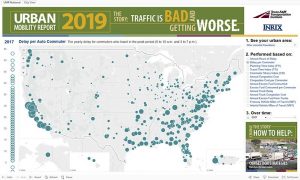By Stas Margaronis
The American Society of Civil Engineers says that a proposed five-year highway bill still lacks a revenue source, such as an increased gas tax, at a time when Congress has passed several large stimulus bills related to Covid-19 economic dislocations.
A spokesperson for the American Society of Civil Engineers said on April 30th: “while EPW (U.S. Senate Environmental & Public Works Committee) did come out with their portion of the bill nearly a year ago, that Committee does not have jurisdiction over the revenue question.”[1]
The revenue source for the highway bill “is left to the Senate Finance Committee and negotiations have been ongoing. On the other side of the Capitol, the House Transportation and Infrastructure Committee still needs to draft and release their bill.”
The spokesperson added that “While a policy framework was released earlier this year, there was no mention of a HTF (Highway Trust Fund) revenue solution, which will be the responsibility of the House Ways and Means Committee. While recent pay-for discussions have been positive with both the Senate Finance and House Ways and Means Committees, it is too early to tell what agreement they will come to.”
HIGHWAY TRUST FUND IN TROUBLE
ASCE has warned that the funding for highways through the Highway Trust Fund is running out. Joe Brady explained in a February ASCE blog post entitled Highway Trust Fund Remains in Trouble::
“…both the Government Accountability Office (GAO) and Congressional Budget Office (CBO)have issued reports highlighting the long-term financial health of the Highway Trust Fund (HTF).”
The ASCE blog post went on to say: “First established in 1956, the Highway Trust Fund (HTF) is the federal fund that pays for bridges, roads, and transit. In 1983, the HTF was divided into two accounts which includes highways, receiving 80% of the revenue, and transit, receiving 20% of the revenue. The HTF has been funded by the federal gas tax rate and has been raised numerous times since its founding but the current rate has been stagnate for over a quarter century cutting its real value by 40% when inflation is factored in. This has led to the HTF currently running a deficit of nearly $12 billion in fiscal year (FY) 2019, with a $7.9 billion deficit for the highway account and $3.6 billion deficit for the transit account. Under the current projected revenue, by FY 2022 the combined deficit will grow to nearly $18 billion.
GAO’s findings support this growing concern, stating in their report that the highway account baseline is able to meet all obligations through 2021, but becomes exhausted in 2022. In January 2019, CBO estimated that $159 billion in additional funding would be required to maintain current spending levels, plus inflation, from 2022 through 2029.
Similarly, CBO recently reported that new forecast projects that the highway account will need another bailout at the end of fiscal 2021 under current spending levels. In FY 2021, the highway account is projected to end the year with $5.9 billion in balances. However, the transit account is projected to end FY 2021 $235 million below was is needed. Despite this mixed information, the CBO is projecting that total revenue will be $426 billion over the next 10 years, but needs an additional $193 billion, or 45% more, to maintain current spending levels.” [2]
IMPACT OF DELAYS FUNDING HIGHWAYS
A second February ASCE blog post also written by Brady, noted that delays in providing a revenue source were discussed at a hearing of the U.S. Senate Banking, Housing, and Urban Affairs Committee where Chairman Mike Crapo (R-ID) stated:
“A long-term reauthorization bill is critical to providing the certainty and stability that transit agencies, cities and states across the country need to make responsible transportation planning decisions. However, we find ourselves at yet another surface transportation reauthorization where the solvency of the Highway Trust Fund (HTF) is the most significant issue that needs to be addressed in order to advance a comprehensive, long-term reauthorization bill. While this Committee does not have jurisdiction over how surface transportation bills are paid for, it is important that revenue shortfalls are addressed in a way that meets current transportation needs.”
The continued delays in funding a highway bill were highlighted by American Society of Civil Engineers’ (ASCE) 2017 Infrastructure Report Card where “ our nation’s transit system received the grade of a D- respectively. This subpar grade is in large part a result of our dated federal gas tax and inability to properly fund the HTF and our current transportation infrastructure needs. In addition to finding a long-term HTF solution, coupled with increased federal investments, leaders at all levels must properly budget and fund transit maintenance and improvements and implement asset management best practices to ensure high system operability… ASCE applauds the Senate Banking Committee for taking this first step in developing comprehensive legislation and we are eager to work with the Committee to ensure our nation has a strong transit network as part of a comprehensive, multi-modal transportation system.”[3]
FOOTNOTES
[1] Email to author April 30, 2020
[2] https://www.infrastructurereportcard.org/highway-trust-fund-remains-in-trouble/ written by Joe Brady February 5, 2020
[3] https://www.infrastructurereportcard.org/senate-panel-begins-work-on-transit-reauthorization-bill/ written by Joe Brady February 26, 2020

